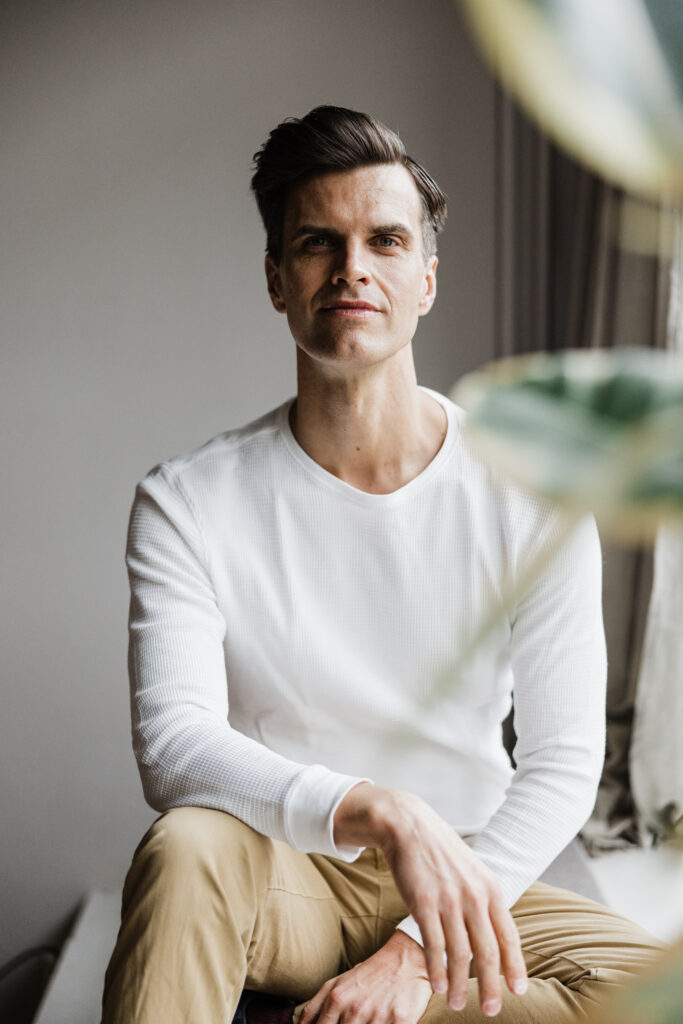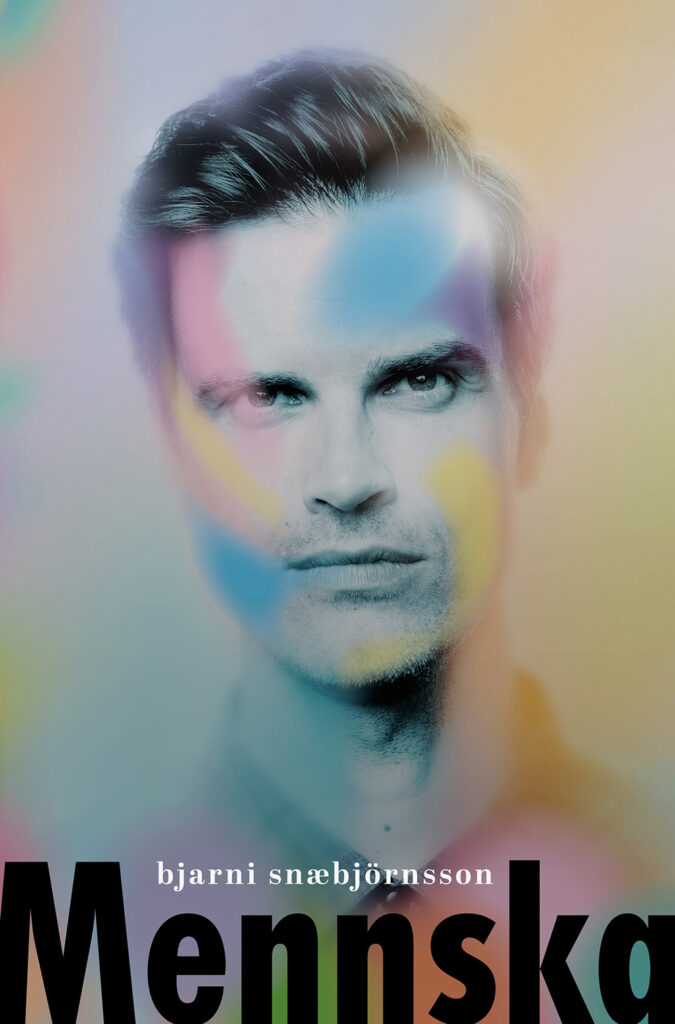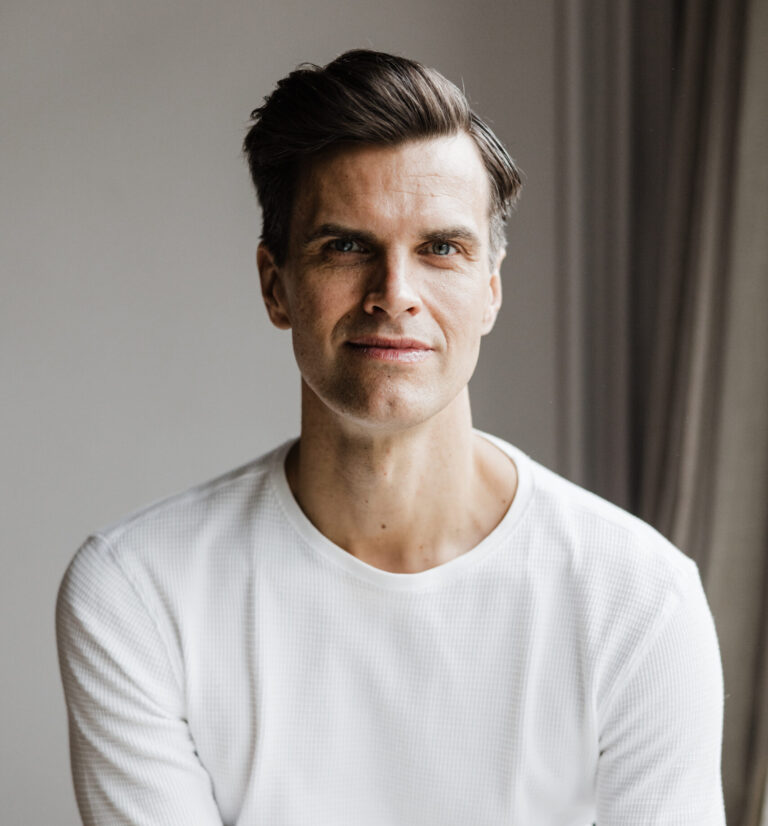Step into the realm of “Mennska” with actor, author and podcast host Bjarni Snæbjörnsson as he embarks on a poignant journey of self-discovery and connection. In an insightful interview, Bjarni shares the inspirations behind his book and podcast, both titled “Mennska”, exploring themes of self-expression, inclusion, and vulnerability.
Rooted in his acclaimed play “Góðan Daginn Faggi” (Good Morning, Fag), Bjarni Snæbjörnsson shares in an emotionally charged conversation the profound impact of revisiting childhood writings for his book and podcast. From therapeutic revelations to navigating systemic prejudices, Bjarni delves into the complexities of queer vulnerability, childhood traumas, and societal issues. With candid reflection on his coming out journey and the transformative experience of facing self-hatred, Bjarni invites readers to join him in fostering understanding and unity. Through his writing and advocacy, Bjarni aims to challenge stereotypes, advocate for systemic change, and pave the way for greater inclusivity and acceptance in the artistic community and beyond.
GayIceland: Can you tell us more about the inspiration behind “Góðan Daginn Faggi” and your upcoming book? What does the book add to the play?
“The inspiration for the play “Góðan daginn, faggi” (Good Morning, Fag), was all my journals and letters that I had found a few years back. I had written these journals when I was a teenager and also during the very anxious period when I was coming out. At that time I was living in Australia and me and my mother wrote e-mails back and forth and these e-mails proved to be very emotional and eye-opening when I read them all again.
The book adds many more layers to the play. It’s a completely different art form where I can add many more and detailed stories to my whole queer journey. In the book for example I lay out almost all the e-mails between me and my mother and leave nothing behind. I also give a much bigger focus on the reckoning of coming to terms with my own self-hatred which I had internalized throughout the years. I do my best to explain my learning curve and how I actually came to terms with the whole journey.”
The book adds many more layers to the play. It’s a completely different art form where I can add many more and detailed stories to my whole queer journey.
GayIceland: How was it for you revisiting these childhood writings?
“It was very therapeutic and empowering. And also difficult. I had to uncover a lot of shame which I had internalized and I ended up having a nervous breakdown while writing the show. It was also very hard to claim the space and allow myself to feel the hurt which the heteronormativity had caused me. I often felt like my pain shouldn’t have been so much, since I am in many ways also privileged and I live in the so called “Queer Paradise” of Iceland. While writing the book I also felt so much sorrow, it was truly an uncovering of feelings in many layers and it’s actually very hard to put into words. Today I am more free than ever and I have never been closer to my true authentic self, but I also know this will be a lifelong journey for me – to get to know myself and stay true.”
GayIceland: In the book, you explore themes of queer vulnerability, childhood traumas, and societal issues. What message or emotions are you hoping to evoke in your reader?
“I hope to make people more aware. About the systematic oppression (and often sly) of the patriarchy and heteronormativity. How these systems actually really hurt a lot of people and how much they control us. I also hope that the reader will join me and celebrating their own queerness and that they go through their own feels, in their own way. Overall I hope that the book will bring us closer together, queer or not. We all have our pain and hurt and stories of oppression, and if we share them, it will create intimacy in society as a whole, which in turn creates solidarity and connection.”
GayIceland: Could you share your experience of coming out to your parents through a letter? How did that moment shape your journey?
“It was very hard. But I knew it had to be done. I couldn’t hold it in anymore (this was in 1999, when I was 21 years old and I was living in Tálknafjörður, a town of 300 people in the Westfjords). I couldn’t bare the thought of coming out to my parents face to face and experience the possible rejection and how their feelings would be hurt, so I wrote a letter and left to Reykjavík for the weekend. When I came back we had a discussion and they told me that they loved me. But the journey of coming out was just starting and I knew that I would always be loved by my parents, which was pivotal because it actually made me feel safer in the world. I trusted them better and I continued to have difficult conversations in the year that followed.”
I have been warned by a producer not to make too much “gay content” because it could pigeonhole me and that I might be doing it to myself.
GayIceland: You mentioned experiencing a nervous breakdown due to self-hatred and societal norms. How did this experience affect your perception of yourself and your art?
“It was a shock on many levels. It completely changed the show, Good Morning, faggi and for myself it was the point of no return. I couldn’t un-see or un-feel the nervous breakdown. It was a wake up call. We are talking about huge things here and sometimes language isn’t enough to explain things, but in short I felt that my whole life had been a lie and I had completely lost myself in the quest of pretending that I didn’t hate myself. Now, when I have worked a lot with therapists, psychologists and journaling (yes, I still do that). I am finding myself more and more every day and I will keep getting to know myself until the end my days. As an artist this has completely shifted me: I am more in touch with my feelings, I am not afraid of my pain, shame or love (well, sometimes I am, but I keep working on that) and I am unafraid to claim my space and use my voice. It was a rebirth.”

GayIceland: Quoting “The Velvet Rage”, you mentioned the concept of queer children experiencing mini-traumas that manifest later in life. How does this idea resonate with your personal journey and the themes of the book?
“It had a groundbreaking impact on my when I learned about micro-aggression through “The Velvet Rage” and other readings while creating the show. Each instance of these micro-aggression is a mini trauma that manifest in our nervous systems and kids and teenagers are especially vulnerable. Often the micro-aggressions are rooted in stereotypes, for example since I was a boy, I was supposed to have girlfriends when I grew up and I learned early through bullying that the words for gay men were very derogatory, for example “kynvillingur” and “öfugur”. Add to that, my life in the Westfjords in the 80’s was completely void of role-models. I didn’t see LGBTQIA+ people anywhere, no one did. This manifested in immense shame and it feels like the show, and now the book, has been a way of washing out this shame by naming it, sitting with it and understanding it. It has taken a long time and both the show and the book unfold many of these stories from my life and shed a light on how subtle and nuanced these micro-aggression moments can be and what the overall impact is in the end devastating.”
GayIceland: You expressed a hope that the book would open people’s eyes to systematic prejudice against the gay community. How do you envision achieving this through your writing?
“I’d love the book to raise awareness on how we stereotype people, how we are able to negatively impact each other and cause real pain through hateful comments and actions. I believe most people don’t intend to be hurtful so it’s important to shed a light on ways to more forward and just let other people be.”
GayIceland: You mentioned encountering systemic homophobia even within the theater community. Can you share more about your experiences and the changes you hope to see in the industry?
“Well it’s not only the theatre, also in the film/TV industry. I have been told that I am “too soft” to play a heterosexual lead. I have also been told that I am “soft spoken”, for whatever reason. I have been warned by a producer not to make too much “gay content” because it could pigeonhole me and that I might be doing it to myself. (He was referring to a character that I created in the very camp musical theatre couple “Viggó and Víóletta”). Once I went through auditions for a TV commercial for Húsasmiðjan (a hardware store), I got the part and after a whole day of shooting a producer called me and told me that they would have to reshoot the whole commercial with another actor because I had been “too soft”.
I am more in touch with my feelings, I am not afraid of my pain, shame or love (well, sometimes I am, but I keep working on that) and I am unafraid to claim my space and use my voice. It was a rebirth.

In short, I refuse to obey these narrow minded rules. I am a man and how to make me feel shameful of my gender expression was gut wrenching, besides often the industry has a clear-but view of what it is to be “man” and how he should sound like, move and act. This is bullshit, men come in all shapes and sizes and they express themselves in a myriad of ways. I express my gender and how I express in my art is up to me. Today it’s still the case that straight actors can easily play gay characters in films and on stage and no one blinks an eye and certainly no one advices them to be “careful” to take on gay roles, they even get nominated for awards doing that. These same actors also play hetero guys and it’s all good. But I have heard that I should be careful to take on gay roles and also that I am not straight enough to play straight roles; there is no winning for me. This is a double-standard that we need to talk about and be aware of. My dream for the future is that this doesn’t matter. It shouldn’t matter what your gender expression is, sexual orientation or anything. People should just be getting the roles they are suited for and gender expression shouldn’t be a problem. But, until then, we need to pave the way with supporting LGBTQIA+ people in the industry and write stories for us, so we can grow as artists and performers and become role models for generations to come.”
GayIceland: As an actor in Iceland, you highlighted the challenges faced by gay actors in a smaller community. How do you navigate these challenges, and what changes would you like to see in the Icelandic theatre scene?
“My stance is to be unapologetic about my sexual orientation and my artistic expression. I don’t pigeonhole myself. I follow my instincts as an artist and I write what I want and act what I want. For now I write very queer material because I feel the importance of it, not only for the queer community but I also think we have so much to give and teach other groups of people. And I am always ready to have this conversation. It feels like people are often afraid of talking about this. I am not and people I know who are queer in the business are not. Please lets just keep the line open and learn from each other.”
GayIceland: Finally, what do you hope audiences take away from your podcast and book? How do you envision your art impacting individuals beyond the queer community?
“I hope that the book will shed a new light on how it is to actually be systematically oppressed as a person of a minority group. And that we all move closer to each other through vulnerability, connection and love.”


